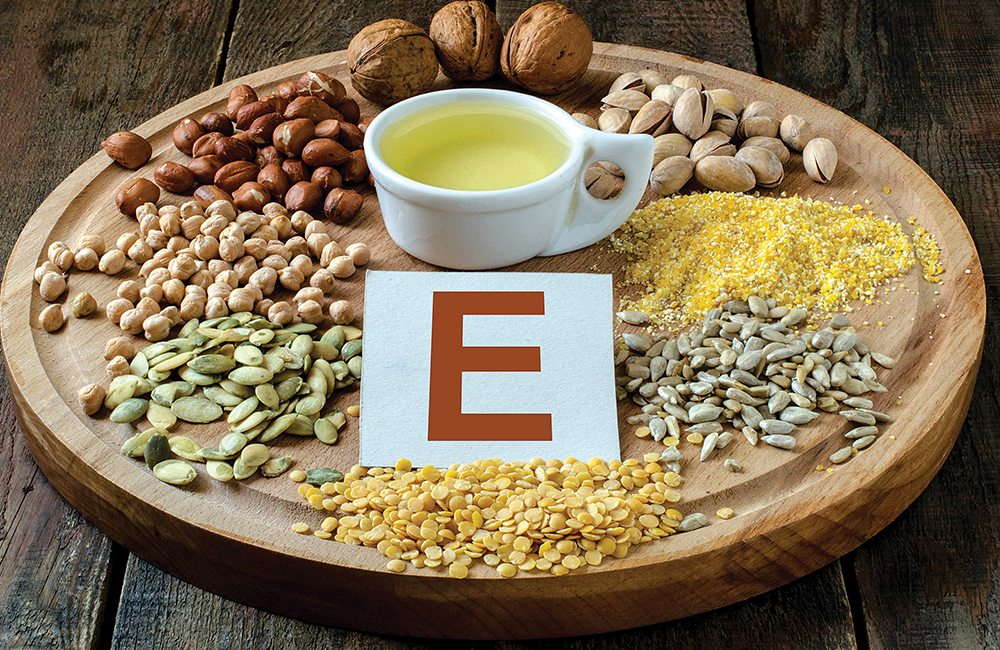Vitamin E is a well-known antioxidant that protects fatty acids and cells from free radical damage. Free radical damage can lead to major diseases and cancers. The most common form of free radicals are actually unshared electrons interact with oxygen to form reactive oxygen species (ROS). The Body creates ROS naturally when it breaks food down into energy. Other forms of free radicals occur when exposed to pollution and ultraviolet light.
Vitamin E is a group name for eight water-soluble plant derived substances, natural intakes of vitamin E have a range of these substances while vitamin supplements generally only have the one or two of these substances.
Sources
Vitamin E is a common vitamin that can be found in several fruits and nuts including; wheat germ oil, sunflower seeds, almonds, hazelnuts, peanuts, corn oil, fatty acids found in meat and poultry, spinach, broccoli, soybeans, kiwifruit, mangoes, tomatoes and spinach.
Supplements for vitamin E while only focusing on the one form of vitamin E is still better than none at all. With such a large range of foods that contain vitamin E it is relatively easy to get the recommended daily intake.
Uses
Vitamin E has a lot of work to do, apart from protecting your body from dangerous free radical damage from internal energy production and pollution sources that we would encounter in our daily life. Vitamin E is also used by the body to assist with the prevention of various disease fighting and body maintenance.
Vitamin E in the blood helps with treating the symptoms of diabetes and the complications that go with it. It has also been known to help with the prevention of several forms of cancer including; lung cancer, oral cancer, colorectal cancer, polyps, gastric, prostate and pancreatic cancer.
Vitamin E in the brain helps treating brain and nervous system diseases including; Alzheimer’s disease and other forms of dementias, Parkinson’s disease, night cramps, restless leg syndrome, and Huntington’s chorea and many more.
Women also have been known to use vitamin E in the preventions of complications in late term pregnancies due to high blood pressure. Vitamin E has also been known to help with a range of problems including Premenstrual syndrome, hot flashes, breast cancer, breast cysts and menopause.
Vitamin E is needed for the proper functioning of the body and being an antioxidant it slows down the process that leads to cell damage.
Daily Intake
Daily intake of vitamin E range from about 4mg from birth to 15mg at 14 years and older and during lactation about 19mg’s are required.
The upper limit of vitamin intake or the most you could take before risking dangerous toxicity is 200mg at one years of age to 1 000mg at nineteen years and older.
Toxicity
Toxicity occurs when you take too much of something, it normally happens when you are overdosing on a particular type of food and the nutrients in that food are far in excess of what is the maximum amount of a certain nutrient. For the case of vitamin E when you have consumed so much vitamin E that you have a developed a toxicity to it.
Vitamin E toxicity lead to blood coagulation, which is when you blood starts to clot inside your arteries and blood vessels. Despite this studies are unclear as to the effect of taking too much vitamin E. As is the case moderation is the key.
Deficiency
Now on the other end of the spectrum Vitamin E deficiency is when you don’t get enough vitamin E. Vitamin E deficiency can lead to peripheral neuropathy, ataxia, skeletal myopathy, retinopathy, and impairment of the immune response. Because the Vitamin E is critical in protecting the body from free radicals and supporting the immune system, people with chronic diseases such as Crohn’s disease, and cystic fibrosis are a greater risk of developing major complications.
Many cases of vitamin E deficiency has been linked to other severe conditions where the body was not working properly in the first place. In those cases, it could lead to muscle weakness and retinal degeneration, liver breakdown, developed nerve damage and the inability to walk.
Getting your daily intake of vitamin E is easy and if you are at risk of either deficiency or toxicity the cure is the same, just vary up your diet.



Leave a Reply
You must be logged in to post a comment.